 |
 |
 |
Ever since England's defeat in a vital World Cup qualifying game
against Italy in Rome in November 1976, there had been the air
of a man on borrowed time about manager Don Revie. He was convinced
that the FA were building up to his dismissal, and the clever
money in the newspapers was on the axe falling after the Wembley
return against the Italians completed the group stages. The paranoia which had been building up in Revie's troubled mind
finally got the better of him, and he decided to deny his masters
the satisfaction of sacking him, and determined the timing and
manner of his own departure after securing a lucrative role as
supremo of football in the United Arab Emirates. The way he chose to break the story led to one of the most histrionic
and self righteous newspaper campaigns of all time. Revie sold the story
of his departure to the Daily Mail. On 11 July 1977, the paper
scooped Fleet Street with a front-page story in which Revie poured out
his heart: 'I sat down with Elsie one night and we agreed that the job was no longer
worth the aggravation. It was bringing too much heartache to those nearest
to us. Nearly everyone in the country seems to want me out. So I am giving
them what they want. I know people will accuse me of running away and
it does sicken me that I cannot finish the job by taking England to the
World Cup finals in Argentina next year. But the situation has become
impossible.' The FA were furious, especially as they did not receive Revie's letter
of resignation until later that morning. The manner of his leaving rankled
with the pompous patriots of Fleet Street who responded to public antipathy
by hastening Revie's fall from grace, branding him a traitor. Some of
the articles written were hysterical in the extreme and old enemy Bob
Stokoe said bluntly, 'He should have been castrated for the way he left
England,' while Alan Hardaker's voice
was thick with biting sarcasm as he spitefully snapped, 'Don Revie's decision
doesn't surprise me in the slightest. Now I can only hope he can quickly
learn to call out bingo numbers in Arabic.' Undoubtedly, Revie's handling of events was clumsy and served
to give ammunition for his critics' most bile-ridden, venomous
outpourings. Even the more considered comments pointed out the
flaws. Johnny Giles: 'It's obvious he shouldn't have done it the way he did.
He didn't do himself justice. He left himself open to savage criticism
by telling the Daily Mail first. There was no defence for it. He
ruined Gerald Sinstadt gave a cool headed and objective assessment of matters
in The Times on 15 July: 'Once again the England football team is managerless. Don Revie … has
resigned without waiting for the virtually inevitable failure to qualify
for the 1978 finals. His task, already difficult in a period when the
general standard was mediocre, had been made harder by injury to several
players who might have raised the level. To that extent Mr Revie was entitled
to sympathy. Now, with the timing and the manner of his departure, that
sympathy and more will vanish. 'It is nevertheless remarkable that the conduct of the outgoing manager
has so far attracted more comment than the qualifications of those who
might take his place. For this Mr Revie himself is largely to blame. The
first announcement - to his employers, the Football Association, as well
as to the public at large - came in the Daily Mail. He was leaving,
Mr Revie was reported to have said, to protect his family from the criticism
his job increasingly attracted: "It was bringing too much heartache." 'Twenty-four hours later, the Daily Mail was able to reveal that
the heartache had been eased by an offer to run football in the United
Arab Emirates for the next four years with a remuneration of £340,000
tax-free. It was also disclosed that when Mr Revie abandoned his team
for the first match of the recent tour of South America in order to watch
Finland play Italy in England's World Cup qualifying group, he also took
the opportunity to visit Dubai. 'Although some of the response to these developments may be attributed
to Fleet Street pique, the issues lie deeper than professional envy in
the media. Whether the Daily Mail outsmarted its rivals as a result
of the perspicacity of its football correspondent or the generosity of
its accountants can be only a matter of conjecture. Whichever the explanation,
either was certain to expose Mr Revie to more of the criticism he has
apparently found so burdensome. 'As manager of England, Mr Revie involved - and, indeed, sought to involve
- the whole nation in his public responsibilities of the past three years.
He might therefore have felt obliged to end that involvement with a more
generously open announcement, especially in the light of his stated resentment
of the 'The timing of the resignation is another matter. Those who have been
forecasting England's certain failure to qualify for a place in Argentina
next year can hardly claim that Revie would have enhanced the prospects
by remaining in office. The sequel to England's matches against Luxembourg
(October 12) and Italy (November 16) was expected to be a clamour for
Mr Revie's removal. So what harm has come from his anticipation of the
demand? 'In Mr Revie's defence it could be said that his position at the Football
Association was not, in any case, as secure as it should have been. Although
he undeniably had his supporters at Lancaster Gate, he cannot have been
unaware of grapevine mutterings last season that unofficial soundings
were being made about his possible successor. 'Perhaps it is worth restating the basic facts of the matter. Mr Revie
was England's manager for three years and one week. In that time 29 full
international matches were played. Fourteen were won, eight drawn and
seven lost. More than 50 players were given the chance to prove themselves.
This was interpreted as indecision rather than a display of fair treatment,
but in reality reflected the paucity of really outstanding individuals. 'Failure in the European Championship, diminishing hopes in the World
Cup, and finally humiliation in the home international championship provoked
mounting disenchantment among critics, paid and unpaid. At that juncture
came the offer of a job which would guarantee in four years security for
life. Which of us can say that, in that position, we would have made a
different decision? Mr Revie's weakness, surprisingly, in a man who has
worked hard at public relations since he became England's manager, was
to make his announcement in a manner that was undignified and ungrateful. 'Team games were nurtured in Britain a century ago as a visible expression
of a code of ethics which, roughly speaking, governed the attitudes of
society at large. Demonstrably, many of those attitudes have changed.
We may deplore the transformation but it is naïve to suppose that sport
can indefinitely preserve old standards in isolation. 'Nonetheless, there are qualities which should not lightly be abandoned.
It is possible to sympathise with Mr Revie for finding himself weighing
in the scales an individual's right to better his own lot against the
obligations of one who has taken on the role of keeper of a nation's dreams.
Equally, it is impossible to escape the irony of the man who encouraged
crowds to sing Land of Hope and Glory turning to seek his desserts in
the desert.' Revie had spoken of the intolerable pressures placed upon him
as England manager, but they were as nothing compared to what
followed in the wake of his departure. The FA charged him with bringing the game into disrepute. Revie refused
to attend the hearing in which he was suspended indefinitely from any
involvement in FA-controlled football until he appeared to The eventual hearing commenced with two objections from the accused.
Firstly, his counsel argued that the FA had no jurisdiction over
their client and, secondly, they objected to the presiding presence
of Sir Harold Thompson, whose post as FA chairman destroyed his
impartiality. Both these objections were summarily brushed aside
and Don Revie was banned from English football for ten years. The severity of the judgement prompted Revie to take the case to the
High Court a year later. Revie made a claim for damages and demanded that
the court declare his ban illegal. The crux of the case hinged upon the
hostility of Sir Harold Thompson, whom Revie's barrister described as
'prosecutor, witness, judge and jury'. The judge listened to a lengthy
series of complaints against Thompson, none of which impressed him. He
concluded: 'Mr Revie is a very prickly man and I think he has been brooding
on imagined wrongs.' Nevertheless, Mr Justice Cantley quashed the ten-year
ban, although his summing up was scathing: 'Mr Revie was the English team manager. He held the highest post of its
kind in English professional football and he published and presented to
the public a sensational and notorious example of disloyalty, breach of
duty, discourtesy and selfishness. His conduct brought English professional
football, at a high level, into disrepute.' The FA was ordered to pay
one third of Revie's costs plus the entirety of their own. Ted Croker
estimated that their total losses were in the region of £141,000. Lord Harewood: 'I think it was an agony for him and the elements of character
assassination on the part of the defending counsel grilling him were very
unattractive. The summing-up of the judge was one of the craziest things
I have ever read. I think that judge was extremely ill-versed in human
behaviour … he was an ass. If he really thought that Sir Harold Thompson
had behaved admirably and Don hadn't, then he is a very, very poor judge
of character ... and of evidence. He plainly disbelieved every word I
said but I don't give a bugger what he thought.' Ted Croker: 'I didn't like the way Cantley handled it at all. I thought
his summing-up was very wrong, his assessment of the various characters
totally wrong ... he praised Sir Harold Thompson to the hilt as being
an honourable man. I didn't think it was fair and he should not have worried
so much about the personalities.' Looking back at the sorry episode, it is difficult to avoid the
conclusion that Revie was simply myopic and self-destructive.
He clearly underestimated the depth of ill-feeling provoked by
his abrupt desertion and as a result suffered terrible damage
to his reputation. Ironically, it was all so unnecessary. His
detractors maintained that greed played the major part in hastening
his departure, but the actual timing was In the end Revie served out three years of the four that the United Arab
Emirates had signed him for, with his new bosses terminating his contract
in May 1980 by mutual agreement, on the pretext that an Arabic-speaking
coach was required. Elsie had never settled in the Middle East, but Revie
enjoyed considerable success, noting, 'We lost only one of our last nine
games at national level. I am leaving a squad of good young players and
am very happy about the whole business.' He almost immediately became manager of the UAE First Division team Al
Nasr, where he remained for a while, recruiting former Leeds player Eric
Smith as assistant. He returned for a short time to a consultancy role
at Elland Road, before another brief stay in the Middle East, managing
Egypt's Al-Al FC. He came back to the UK again on a permanent basis in
1984, seeking to land the post of QPR boss, and saying: 'I never thought
I'd have the chance to get back into the English game but I have discovered
I have missed the involvement. I've been away seven years and don't know
everything about First Division players. But I'm still able to get on
to the training pitch and after 40 years, I feel I have something to offer
the game.' However, Revie fell out with Rangers chairman Jim Gregory over the package,
prompting the QPR supremo to say, 'The terms he asked for then were not
those he was seeking when I met him. In view of his increased demands,
I have unfortunately come to the conclusion that I no longer wish Mr Revie
to be the new manager of Queens Park Rangers.' Revie eventually ended up working part time for Total Sport,
the sports booking company run by his son Duncan, before retiring
with Elsie to Scotland. In May 1987 specialists diagnosed Revie as suffering with the incurable
motor neurone disease, which causes gradual muscle wastage. Faced with
the possibility of imminent death, Revie was admirably defiant: 'I aim
to do all I can to raise as much as I can for research into the disease.
It's not all doom and gloom.' That same indomitable spirit was conveyed
in a message from Billy Bremner who urged his gaffer to keep fighting,
'just like you told the players to in our great days together'. There was a final reunion with the players he had loved so much from
his time at Elland Road. In May 1988, Leeds United arranged a benefit
match in his honour, with the money being split between research into
motor neurone disease and the Leeds Children in Need campaign. For many,
that return visit to Elland Road was the first occasion in years that
they had encountered their former boss, who was now confined to a wheelchair.
'It was cruel for someone associated with the physical side of life,'
says Joe Jordan. Johnny Giles recalls: 'He was bad ... he couldn't move
his arms ... but he didn't want to talk about it.' For Billy Bremner,
it was a poignant occasion. 'He was crying a bit that night and reminiscing
about us. He loved reminiscing. I saw him in the early stages of his illness
and he was reminiscing about his Manchester On 26 May 1989 Don Revie finally lost his battle against the
disease and died in Murrayfield Private Hospital in Edinburgh.
When the news broke, the gates of Elland Road were soon bedecked
with scarves and posters in tribute to the man who had given Leeds
United all the success it had ever known. Four days after his
death, Revie's funeral took place at the Warriston Crematorium
in Edinburgh, an occasion which reunited not only former Leeds
players but other admirers, among them Lawrie McMenemy, whose
managerial career Revie had encouraged, and Kevin Keegan. Revie's funeral was conspicuous for the absence of soccer officialdom.
Even the once acerbic press deplored the 'FA's final snub'. A final poignant
comment from Kevin Keegan begged for a long overdue reassessment of Revie's
contribution to football: 'It saddens me that the public at large had, and still have, the wrong
impression of him. He was kind, generous and caring. When he left the
England job, he did the right thing for his family but did it wrongly.
He knew it and was big enough to admit it. He'd have been as successful
as Alf Ramsey with England if the players had been good enough. We weren't.' In contrast, however, Don Revie was exceptionally good. He was
one of the greatest managers who ever lived, and the architect
of a remarkable if notorious revolution that saw a provincial
club emerge from the depths of the Second Division to become one
of the premier outfits in Europe. The tale of the man and his
club is a dramatic if tragic one, and one which will never be
forgotten. Part 1 An Appreciation - Part
2 Learning the ropes 1927-51 - Part 3 Centre
stage with City 1951-56 - Part 4 Shuffling off
stage 1956-61 - Part 5 On the march with Leeds
United 1961-67 - Part 6 The agony and the ecstasy
1967-74 - Part 7 Inn-gerland! 1974-77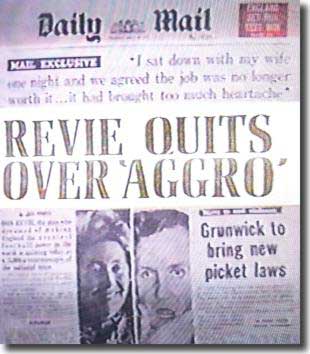 Part
1 An Appreciation - Part 2 Learning the ropes
1927-51 - Part 3 Centre stage with City 1951-56
- Part 4 Shuffling off stage 1956-61 - Part
5 On the march with Leeds United 1961-67 - Part
6 The agony and the ecstasy 1967-74 - Part 7
Inn-gerland! 1974-77
Part
1 An Appreciation - Part 2 Learning the ropes
1927-51 - Part 3 Centre stage with City 1951-56
- Part 4 Shuffling off stage 1956-61 - Part
5 On the march with Leeds United 1961-67 - Part
6 The agony and the ecstasy 1967-74 - Part 7
Inn-gerland! 1974-77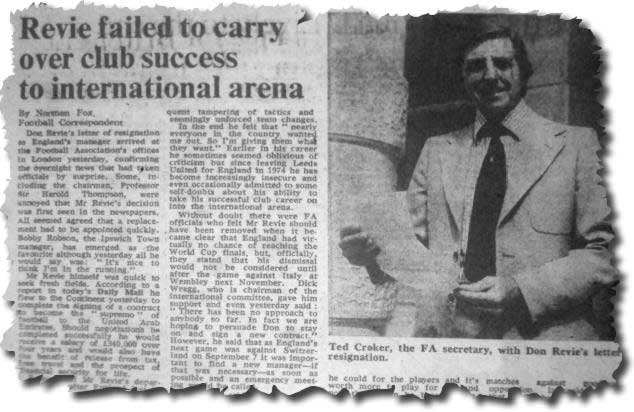 a
lot of good work and then became a baddy ... which he wasn't. But who
isn't greedy? The people who write the stories in the tabloid newspapers
might be the greediest in the world.'
a
lot of good work and then became a baddy ... which he wasn't. But who
isn't greedy? The people who write the stories in the tabloid newspapers
might be the greediest in the world.'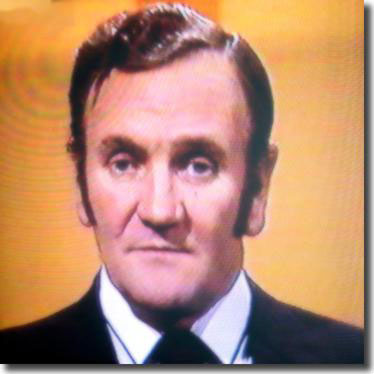 fact that "everyone seems to have believed that I've just been feathering
my own nest."
fact that "everyone seems to have believed that I've just been feathering
my own nest."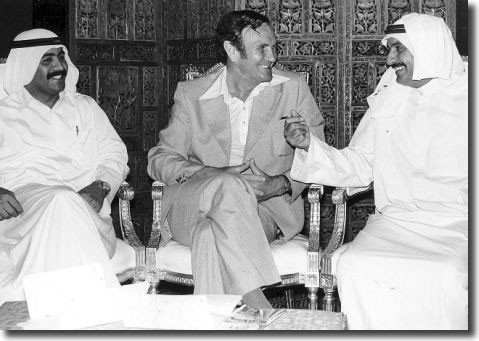 face
their complaints. It was 18 December 1978 before Revie would agree to
meet.
face
their complaints. It was 18 December 1978 before Revie would agree to
meet.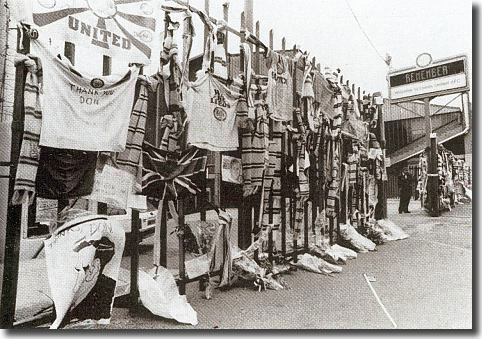 not
particularly clever in financial terms. If he had stayed with
England for those vital last months he might even have won everything
- the Arab money, compensation from the FA and a relatively quiet
exit.
not
particularly clever in financial terms. If he had stayed with
England for those vital last months he might even have won everything
- the Arab money, compensation from the FA and a relatively quiet
exit.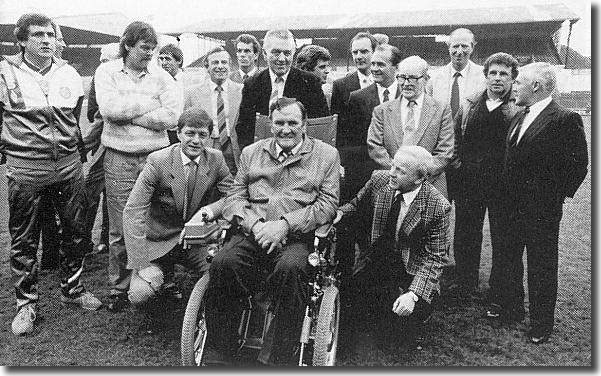 City
days.' Lord Harewood recalls: 'It was very moving and Don was in good
form although totally incapacitated and blown-up by steroids or whatever
they were giving him. I spoke quite a lot to him although we were talking
superficialities. Don didn't even stay for the game. He couldn't take
the strain ... there was too little resilience left.'
City
days.' Lord Harewood recalls: 'It was very moving and Don was in good
form although totally incapacitated and blown-up by steroids or whatever
they were giving him. I spoke quite a lot to him although we were talking
superficialities. Don didn't even stay for the game. He couldn't take
the strain ... there was too little resilience left.'